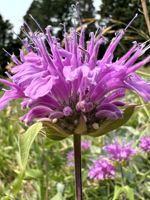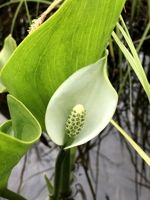Mon-Fri 9am - 5pm Mountain time
Wild Bergamot vs Water Arum
Monarda fistulosa
Calla palustris
NOT AVAILABLE THIS SEASON - MIGHT RETURN
CUSTOM GROW
Wild Bergamot is a native perennial wildflower that is known for its fragrant lilac-purple tubular flowers. The flowers grow in dense terminal heads and bloom from mid-summer to early fall. Deadheading spent flowers will encourage new blooms, prolonging its display. They attract pollinators such as bees, butterflies, and hummingbirds. It also serves as a host plant for the Raspberry Pyrausta (Pyrausta signatalis) butterfly.
Wild Bergamot belongs to the mint family, and its leaves, stems, and flowers are all edible. The leaves can be used to make tea or as a flavorful herb, with a taste often described as a blend of oregano and thyme.
It is resistant to deer and rabbits but can be susceptible to powdery mildew if planted too densely with poor air circulation. Wild Bergamot tolerates heat, drought, and poor soils, making it a low-maintenance addition to a variety of projects. It is well suited for pollinator gardens, wildflower gardens and naturalization projects.
Water Arum is a native perennial wetland plant known for its showy white oval sheaths (spathe) that surround a yellow-green, cylindrical flower spike (spadix). It has large, oblong, heart-shaped leaves on stems that rise above the water from shallow, spreading rhizomes. The blossoms are followed in late summer by tiny, pear-shaped fruits that ripen to bright red, adding ornamental interest to wet habitats.
Water Arum provides food for birds and small mammals that eat its berries, and its flowers attract pollinators. It can tolerate cold climates and forms colonies in shallow water and saturated soils. It is well-suited for ecological restoration, riparian planting, naturalisation, and habitat projects in wet and shaded environments.
Wild Bergamot Quick Facts
Water Arum Quick Facts
Toxicity: toxic if ingested

